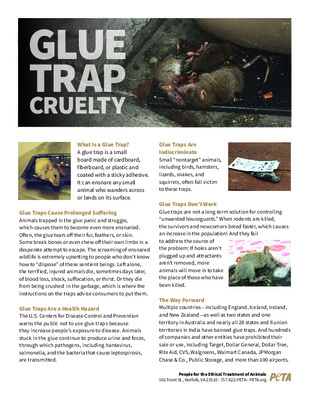Item 4 - Glue Trap Factsheet January 2024 — original pdf
Backup

What Is a Glue Trap? A glue trap is a small board made of cardboard, fiberboard, or plastic and coated with a sticky adhesive. It can ensnare any small animal who wanders across or lands on its surface. Glue Traps Are Indiscriminate Small “nontarget” animals, including birds, hamsters, lizards, snakes, and squirrels, often fall victim to these traps. Glue Traps Cause Prolonged Suffering Animals trapped in the glue panic and struggle, which causes them to become even more ensnarled. Often, the glue tears off their fur, feathers, or skin. Some break bones or even chew off their own limbs in a desperate attempt to escape. The screaming of ensnared wildlife is extremely upsetting to people who don’t know how to “dispose” of these sentient beings. Left alone, the terrified, injured animals die, sometimes days later, of blood loss, shock, suffocation, or thirst. Or they die from being crushed in the garbage, which is where the instructions on the traps advise consumers to put them. Glue Traps Are a Health Hazard The U.S. Centers for Disease Control and Prevention warns the public not to use glue traps because they increase people’s exposure to disease. Animals stuck in the glue continue to produce urine and feces, through which pathogens, including hantavirus, salmonella, and the bacteria that cause leptospirosis, are transmitted. Glue Traps Don’t Work Glue traps are not a long-term solution for controlling “unwanted houseguests.” When rodents are killed, the survivors and newcomers breed faster, which causes an increase in the population! And they fail to address the source of the problem: If holes aren’t plugged up and attractants aren’t removed, more animals will move in to take the place of those who have been killed. The Way Forward Multiple countries—including England, Iceland, Ireland, and New Zealand—as well as two states and one territory in Australia and nearly all 28 states and 8 union territories in India have banned glue traps. And hundreds of companies and other entities have prohibited their sale or use, including Target, Dollar General, Dollar Tree, Rite Aid, CVS, Walgreens, Walmart Canada, JPMorgan Chase & Co., Public Storage, and more than 100 airports. People for the Ethical Treatment of Animals 501 Front St., Norfolk, VA 23510 • 757-622-PETA • PETA.org GLUETRAPCRUELTY